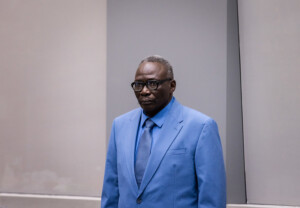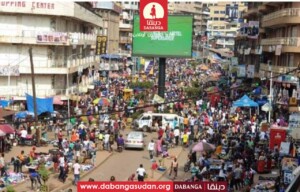HRW: Unamid absent as attacks surge villages in Darfur’s Jebel Marra
In response to the latest report of the UN Secretary-General on the joint African Union-United Nations mission in Darfur (Unamid), Human Rights Watch urges the peacekeepers “to deepen and strengthen – not abandon– its human rights and protection role”.
On Thursday, the head of Unamid, Jeremiah Mamabolo, briefed the UN Security Council (UNSC) on the current situation in Darfur.
 Chinese UN peacekeepers in March 2018 on their way to Golo, Jebel Marra in Central Darfur, to construct a new Unamid temporary base (Unamid)
Chinese UN peacekeepers in March 2018 on their way to Golo, Jebel Marra in Central Darfur, to construct a new Unamid temporary base (Unamid)
In response to the latest report of the UN Secretary-General on the joint African Union-United Nations mission in Darfur (Unamid), Human Rights Watch urges the peacekeepers “to deepen and strengthen – not abandon– its human rights and protection role”.
On Thursday, the head of Unamid, Jeremiah Mamabolo, briefed the UN Security Council (UNSC) on the current situation in Darfur.
“The general security situation in Darfur remains calm, except for sporadic clashes between the Sudan Liberation Army of Mr. Abdul Wahid [Abdelwahid El Nur], government forces and nomads in Jebel Marra,” Mamabolo stated. “It is imperative that concerted efforts be exerted towards mobilisation of financial resources to consolidate and sustain the prevailing peace and stability in the region,” he said.
Jehanne Henry, team leader of the HRW Africa Division however said in a comment on Thursday that “there’s a real risk the dire protection needs of civilians will be ignored or forgotten” – with “such a gloss-over assessment from peacekeepers”.
Pointing to the latest report of the UN Secretary-General on Unamid that called the situation in Darfur “generally stable” with some “low scale skirmishes”, Henry mentioned the recent torching of a number of villages by “the notoriously abusive Rapid Support Forces” (RSF), Sudan’s main militia, the “killing at least 23 civilians and displacement of about 15,000 people into the mountains”.
Absent
According to the HRW team leader, the “UN-AU peacekeepers and other international actors do not know the full scale of the death toll and destruction being wrought on civilians in Jebel Marra – or across Darfur – because they are largely absent.
“Sudan has restricted access and the peacekeeping mission has been under pressure to quickly downsize. While Jebel Marra was recognised as a trouble area over a year ago, construction on a temporary operating base for Unamid is only just beginning and peacekeepers still face access problems.”
“There’s a real risk the dire protection needs of civilians will be ignored or forgotten” – with “such a gloss-over assessment from peacekeepers” – HRW
HRW emphasised that areas without peacekeepers heighten the risk that civilians will be unprotected from government violence and abuses. “The mission’s reporting confirms that widespread rights violations, including sexual violence, are committed across Darfur with impunity.”
The human rights watchdog further warned for the consequences of the decision by the UNSC last year to reduce the peacekeeping mission with one third. “As it downsizes, Unamid needs to become agile enough to respond quickly to violence across a vast area and to deepen and strengthen – not abandon– its human rights and protection role, which brought it to Darfur in the first place.”
New attacks
In the past years, government forces have made various attempts to eliminate bases of the Sudan Liberation Movement faction headed by Abdelwahid El Nur (SLM-AW) in the Jebel Marra area during the dry seasons (roughly between January-and May).
This year in March, government forces, consisting mainly of RSF troops, attacked rebel sites in East Jebel Marra. The next month, areas in northwestern Jebel Marra were targeted. At least 13 villages burned to the ground. Tens of thousands of people fled their homes.
On April 27, the US Department of State in a statement expressed its “serious concerns” about the renewed fighting in Jebel Marra.
It cited “credible reports” about villages being targeted during clashes between Sudanese government forces and SLM-AW fighters “resulting in thousands of newly displaced civilians”.
Unamid's “reporting confirms that widespread rights violations, including sexual violence, are committed across Darfur with impunity” – HRW
Exit of Unamid
The Sudanese authorities began to push for the exit of Unamid in end 2014, after the peacekeeping mission urged an investigation into a mass rape in North Darfur's Tabit on October 31 that year.
On June 29, 2017, the UN Security Council renewed Unamid’s mandate for another year. It also decided on a reduction of the peacekeepers “in two six-month phases while closely monitoring the situation on the ground.” More than a third of the nearly 19,000 Unamid military troops and police officers were to be withdrawn.
The Sudanese Ministry of Foreign Affairs welcomed the decision, and called it “an explicit recognition of the realisation of peace and security” in the region.
Darfur displaced, Sudanese politicians, and international activists have all warned for the consequences of a downsizing of the number of peacekeepers for the people in Darfur.
“The last couple of years, the attacks, killings, rapes, theft, and kidnapping have increased again. There is ample evidence for this. Even Unamid troops themselves as well as aid workers have been targeted,” Hussein Abusharati, spokesman for the Darfur Displaced and Refugees Association, told Radio Dabanga in June last year.











 and then
and then